E' vecchissima. ma ci tengo a metterla su.
La trovate anche qui:
www.drummagazine.com/features/post/...nged-sevenfold/Jimmy Sullivan: Revenge Of Avenged Sevenfold
By Andrew Nusca // Photos by Neil Zlozower
Many of you have asked about the November 2007 Jimmy Sullivan cover story. It can be ordered from our store.--The Editors.
Jimmy Owen Sullivan is staring at his feet. It's a sole-melting afternoon in July and the Avenged Sevefold drummer his fumbling with his black nail-polished fingers inside a discreet, air-conditioned studio on 23rd treet in Manhattan. The Rev, as his bandmembers call him, is clearly uncomfortable, made only more so by the way he has draped his tat-on-black, more than six-foot frame across the black learher couch nudged up against the soundproofed back wall. The clinking of the assortment of metal jewelry around his wrists is one of tonly two sounds in the room. The other is a muted ticking of the mechanism within the CD palyer three feet to his right. Hehas said nothing; he has been silent since entering the room and now he seems even more distant, gazing past the pink pastel polo shirt of his preoccupied manager to the other side of the glass beyond the rows of sliders on the soundboard, where a naked collection of microphone stands are huddled together and covered with a canvas tarp. The Rev knows it's just another day in the process of recording his band's follow-up album to their gold-certified hard rock/metal hybrid City of Evil, but seeing those microphones has distracted him from the task at hand.
It’s been a long couple of months for The Rev. Much of his year has been spent writing and recording basic tracks for the album, and just a few days prior, his iPod went berserk, vaporizing the 4,500 rare and vintage songs he had stored for inspiration. “I don’t do too well with technology,” he professes, arms held wide in surrender. But there is a sort of sadness in his words, a longing for a simpler time echoed in the sentiment that was evoked when he saw the microphones in their glass prison in the studio. For certain people, it’s a moment of distraction in a busy workweek. But for The Rev, his lament is an unguarded moment of truth: The Rev just wants to play. And he’s been cooped up in the studio far too long.
BEGINNINGS. For such an avid drummer, The Rev started his musical career with the most ironic of words: “No.” At only five years old, the Huntington Beach, California, native was urged by his parents to take piano and drum lessons with the goal of learning an instrument, any instrumement. Little Jimmy resisted with all of the passion a child can muster. “I fought them on it,” he says. “But I was always kind of interested.”
That kind of constant resistance and curiosity was a part of what inspired The Rev to press on with his musical education. He began lessons at age ten on “a serious mail order drum kit – a piece of crap,” he says, laughing. “I got my own kit a year later.” The Rev started with what might be seen as an unusual cocktail of basic drumming fundamentals for an elementary school student: rudiments, composition, and thrash metal. “I started learning stuff like Metallica,” The Rev says. “I started transcribing that stuff. I started with Carmen Appice and rudimentary basics and technique training. The music I was listening to was metal, so I started transcribing it.” It was an upward climb from there. “I started tackling more difficult stuff. I started getting into faster stuff, first Pantera, then Slayer, classics like that. Then I started getting into prog – Dream Theater and Rush. Then I started getting into funk, like Dave Weckl and Terry Bozzio. I tried to pick up as many things as I could from all of those influences. Then I joined a percussion ensemble at Harbor College in L.A. I was in that from sixth to eighth grade.” It took virtually no time for The Rev to impress his fellow students. After all, if being a drummer in a punk band impressed his female classmates, imagine what a double bass setup before puberty can do. “They loved it,” he says, smiling. “When you’re playing double bass and you’re in middle school, no one can believe it. I started in sixth or seventh grade. But no one ever taught me, so I didn’t really figure ˝i’ve never been able to stay in one place and i just like the excitement of getting out there and playing live and the whole lifestyle that comes along with it˝
out how to build up your endurance and stamina to just do straight sixteenth-notes as fast as you want until much later, until I was about 19 or so.” The Rev says he began to branch out and develop his own style of playing – and composition – between the ages of ten and sixteen, bolstered by the technical base he developed while under the tutelage of L.A. Harbor College professor Jeannette Wrate. “She was very influential in me being a musician in general,” he says. “She took me into her percussion ensemble, which kind of ended up being a band, and she taught me about music theory as well as drum theory. She’s always pumped me up and never failed to point out to me that she thought I had a lot of potential as a drummer. I think a lot of drum instructors don’t really influence you to try to write music; they mainly focus on drumming, you know?” That support was crucial to developing the fundamentals behind his current style of playing. “It was very important because I think technical training can help accelerate the learning process,” The Rev says. “For example, what would take someone without professional training a year to learn might take someone with good instruction, a month. It can accelerate the process an awful lot.”
FROM PUNK TO PANTERA. By his sophomore year of high school, The Rev parlayed his interest in girls and reckless abandon into playing with punk rock bands at parties. Far from the ideal student (he was kicked out in 2000 for “a whole slew of behavioral infractions”), The Rev began to put his energy full-force into the burgeoning scene, starting a metalcore-sounding Avenged Sevenfold with childhood friends M. Shadows and Zacky Vengeance and using the stage name “The Reverend Tholomew Plague.” Synyster Gates was added soon after. “We’d always been best friends growing up,” he says. “Right when the first album was being recorded, we added him because we needed that crazy lead influence and all his musical knowledge.” The ink still fresh on their high school diplomas, the bandmembers went into the studio to record what would become their first album, Sounding The Seventh Trumpet. It was a shoestring affair from day one – but the effort started the domino effect that would launch their career. “We pretty much fully funded the recording of our first album on our own, just doing lousy day job kind of stuff,” The Rev says. “That recording actually got noticed by the owner of Hopeless Records, who offered to sign us. That was step one, getting on that indie label and putting out Waking The Fallen, which got noticed by all the major labels. And now we’re on Warner Brothers.” With a major record label contract came a major recording, 2005’s City Of Evil. Recorded in Houston, the album spawned a solid showing on the charts, a licensing agreement with gaming giant Electronic Arts, a video by top director Wayne Isham, and an appearance in Guitar World’s list of 100 Greatest Guitar Albums Of All Time. The album’s popularity and subsequent tour also sparked opportunities unlike any the band had ever expected, bringing The Rev full circle with his idols. “The biggest headlining show that we’ve ever done was at the Gibson Amphitheater [in Los Angeles],” he says. “That was an overwhelming moment. Also, a great moment was ˝i just always think it’s really powerful when you’re doing any particular hand fill, if you throw the double bass constantly under it˝
the first time we went out on stage with Metallica. Oh, and meeting a lot of my idols, like Vinnie Paul. Those moments are always really rewarding.”
FINDING A GROOVE. The Rev’s time in the studio during the summer has paid off handsomely. From the first snap of the snare and the first note on the piano, the new Avenged Sevenfold album is a departure. Long-known for its Tool-like song lengths and playing chops, the five-member, hard rock/metal band has honed its sound into a largely subfive- minute affair that has the group seemingly functioning more as a unit than on previous recordings. At the forefront is The Rev’s acrobatic, intricate drumming – a thick, groove-based foundation that acts as a fusing mortar for the other four members of the band. The change was both a conscious decision on the band’s part and an extension of its style, derived from feedback received over hundreds of tour dates around the world. “Yeah, it’s definitely more groove-oriented,” The Rev says. “I think people will dig on it. We’ve always been more into hard-hitting grooves that you want to bang your head to the whole track rather than wandering off in all different directions and writing songs that sound like three songs put together. This album, every song has its unique personality and it just sticks to that point, even though it does waver within the confines of each song. Every song is coming from a different angle and a different place and we attack the vibe of it full force. Say this one track, ‘Critical Acclaim,’ is all just in-yourface madness going on, it all just sticks to that and doesn’t transition to something that’s completely left field.” When it comes to an analogy for his and the band’s playing, The Rev keeps it simple: “Compact, like a steamroller.” Nowhere is The Rev’s experimentation more evident than on “Almost Easy,” a three-minute-fifty-seven-second can of rocket fuel that’s as thick as your dad’s Barbasol lather. While the song structure is tight and the band is more locked in than ever, the climax of the ride is a segment in which The Rev doubles up on two kick drums and two ride cymbals simultaneously, creating the visual and aural illusion that he’s got at least double the number of arms. “I call it ‘the double-ride thing,’ just for lack of a better definition, because no one does it,” he says. “It is very hard to keep yourself on the bells without being able to look. You can’t look at the two places at the same time. My right hand naturally can find the ride on its own, so I have to look at the bell on the left, and you also have to bring it over to hit the snare, so it gets a bit hard – and that’s when you start looking like a f**king octopus weirdo. It’s awesome.” A creature from the deep is exactly what The Rev looks like playing his three-kick, seven-tom setup in the middle of the song, a display so outlandish that even the band’s manager gets excited talking about it. “You’ve got to listen to this, he looks like an octopus when he plays this,” Larry Jacobson says, grinning as the track plays. The Rev says the inspiration for this trick came from an integral part of his own drumming style: his double bass-playing feet. “I just always think it’s really powerful when you’re doing any particular hand fill, if you throw the double bass constantly under it, it just beefs up the power of it, and I like to go back and forth between my cymbals and my hands while keeping the double bass patterns underneath it, and attaching cymbals, a splash or a ride, to the double kick,” he says. “On the last album, I would sometimes go back and forth between the ride and the splash and I thought, Why not go for two ride bells and have it sound as crazy as possible and in your face and that metallic sound, you know?”
(DE)COMPOSING. Versed in playing guitar thanks to informal lessons from bandmate Gates, The Rev contributed heavily to writing the band’s new eponymous album. While its predecessor, City Of Evil, was written “conglomerately,” The Rev says he contributed guitar riffs and even lyrics to the 18 or 19 songs he laid down in the studio. “Four of the songs I wrote every riff and verse and chorus, and everyone else kind of had the same on the other songs,” he says. A self-admitted perfectionist, The Rev says the compactness and locked-in nature of the band’s new sound is partly the result of his continued concentration on developing his songwriting skills. “I’ve been focusing more on just choosing the proper fills and trying to be as creative as possible with them, not just your typical hand fill or hand and foot fill, but incorporating all four limbs and using the [Sabian] propeller [a prototype percussive element], and all the attachments I have on the kit,” he says. “Stuff that just fits each individual riff. Instead of playing as fast as possible all the time whenever possible – though there’s plenty of blindingly fast stuff and I push myself when it calls for it – but when it doesn’t, I take a lot of pride in finding the perfect part for the moment, the particular circumstance.”
The Rev says he gleaned ideas from combing through the band’s demo reels, extracting moments he liked and expanding on them. Trying new sound effects also proved beneficial. “I write every part out until I get it as perfect as possible,” he says. “An approach I took on this record was definitely to jam the songs out more and take things that I liked and develop them. Aside from incorporating different percussive aspects, I also would change up the toms on certain songs and I’d play patterns between the ride and Roto Toms on one of the songs.”
A lifelong fan of Oingo Boingo genius Danny Elfman – “he’s pretty much my musical hero” – The Rev wrote much of his creative contribution on the piano, and used the process as an opportunity to touch on his idol’s legacy by collaborating on the song “A Little Piece Of Heaven” with former Oingo Boingo members, keyboardist Marc Mann and guitarist Steve Bartek (the latter produces Elfman scores). “It’s a really interesting, crazy, Halloweenish song that we wrote that will possibly, almost certainly be on the record,” The Rev says. “Definitely fun for anyone to listen to – a good reason to get the album right there.” Nonetheless, offering up the best ideas to his bandmates is what brings most songs together, The Rev says. “Most of the best songs that we have is where everyone puts in their best parts and everyone just clicks,” he says. “There’s a trust there; there’s an openness. There’s no insecurity. We just write whatever we want and we’d be the first to say, ‘Nah, that riff kind of sucks,’ or ‘That’s awesome.’”
The Rev says he was actually surprised by the quality of some of his bandmates’ contributions, including the depth of some of the lyrical content. “Matt [M. Shadows] shocked me with a few of the tracks,” he says. “Being involved with the songs, I was surprised I could be so touched by it, or so pumped up by it.” Overall, The Rev says the album’s sound reflects the growth of the band over the last couple of years – a testament to its tenacity. “We’ve just naturally progressed as human beings,” he says. “We’ve never tried to make the same album twice and I think it’s really disappointing every time I buy an album and it’s a parody of the previous album. You can definitely expect new things. Overall, it’s ten times better of a record.”
PASSPORT TO POPULARITY. Red Hot Chili Peppers frontman Anthony Kiedis once declared that one thing he learned as a rock musician is that if there was anything to spend money on, it was travel. Now a veteran of globe-spanning tours, The Rev says he anticipates the U.S. tour that will follow the new album’s release around October – and the end-of-summer jaunt to Asia preceding it.
“I love it; I live for it,” he says. “I’ve never been able to stay in one place and I just like the excitement of getting out there and playing live and the whole lifestyle that comes along with it. I like to party when the time to party is right, as do we all, I believe. Being in new countries every week is just awesome when you take in the foreign culture. When we go to other countries, we always make sure we have a couple days in between shows and get to see the places we want to see. It’s perfect – you’re on vacation and you’re working, too. I’m obsessed with seeing as much of the world as possible.” ˝
But touring is as much work as it is play. The Rev’s sleevelength collage of tattoos hide the brute behind the beauty, and he makes no concessions when it comes to preparing himself before a show, warming his hands for “five minutes on, two minutes off,” and doing stretches to “get the blood flowing. The first few shows are always tough – I’ve been playing balls-out with my hands for 16 years,” he says. “But it’s better to play, chill out all day and let the muscles rest, and then go all-out the next day.” But as meticulous as he is while composing, or playing, or even discussing the finer points of music theory, The Rev continues to try to play down his reputation as a party-hard rocker in the vein of Axl Rose or Sebastian Bach – despite having gone out for a night on the town with the pair in Prague. “Some things get blown up about us; there’s always hype out there,” he says. “We’re pretty much relaxed and doing business all day and then we get to unwind after the show at night. At this point, we’re mainly focused on our art and going out there and connecting with as many people as possible because that’s the truly rewarding thing of it. We’ve had our wild spells in the past, and they’ve been publicized and stuff, and we do like to have fun whenever we can, but mostly music is the focus these days.”
ACCESSING EXCESS. As traditional hard rock continues to slide down the charts – along with other styles, of course – Avenged Sevenfold is gathering its energy around the “long tail” concept, a term coined in 2004 by Wired editor- in-chief Chris Anderson that suggests focusing less on sales volume and more on career longevity. As Avenged Sevenfold nears the release date of their new album, The Rev says the band recognizes that its ever-expanding core audience is still the fuel that ignites their particular brand of fire. “All CD sales are going downhill, so it’s not like rock has the problem,” he says. “Metal and rock bands like us are actually on the uphill because we don’t rely as much on CD sales or radio play for the longevity in our career. The type of music we play, we have fans that are lifers, just like I’m a lifer for my favorite bands. It’s always been like an underground pulse. There’s just something about the type of music. We just want to get to the people that want to be a part of that core audience. We want to make a life out of it, you know?”
It’s those “lifers” who keep the band grounded and its vision focused, The Rev says. “I’m just proud and I’m touched when I see someone with a new Avenged Sevenfold tat, and now I always make sure I check them out if they’re sportin’ ˝one of the major aspects of it is the spectacle on stage, the pictures that you see of us, the musicianship˝ ( ) one. It makes you feel like you’re involved in a huge meaningful thing. That’s meaningful if you put someone else’s ink on your body. It’s more meaningful than listening to a pop song on the radio.”
Part of that meaning is the band’s image. According to The Rev, the way the band dresses and the way he and his bandmates refer to each other is a true manifestation of their personalities – not an act. The ink is real, and the piercings are legit; through the interview, he refers to his bandmates interchangeably by their stage and given names. “It’s honest,” he says, “and that honesty is the thing that you do have in common with a fan. “One of the major aspects of it is the spectacle on stage, the pictures that you see of us, the musicianship, and everything that goes into the songs and the music that we play,” he says. “It’s all very real and none of it is contrived in any way, shape, or form, and I think a lot of our fans can see that and feel it. When I see that in other artists, it’s much more attractive to me, and I want to follow it and be a part of it.”
Being a part of it is what keeps the Avenged Sevenfold bus rolling – never was that sentiment more evident to The Rev than when he reviewed footage from the band’s last world tour, a months-long jaunt documented in the recent release of its first live DVD, All Excess. But the band also recognizes the path it has already traveled and hasn’t had any Some Kind Of Monster moments yet, he says. “Those clips make me and all of us just feel great about the journey that we’ve taken to get to this point,” he says. “The fans that have come along with it. Just going from playing a backroom of a bar to a show for 80,000 people – that’s a wild ride that will continue. Like most bands, we’re a family, so family before band. If we broke up tomorrow, we’d still be friends.”
The Drum Kit
DRUMS DW Collector Series with a Snakeskin Wrap and Black Hardware
1 22" x 18" Bass Drum
2 14" x 5" Vintage Bronze Snare with Black Hardware
3 8" x 5" Tom
4 8" x 7" Tom
5 10" x 8" Tom
6 12" x 9" Tom
7 16" x 9" Tom
8 18" x 16" Tom
CYMBALS Sabian
A 14" AAX-Celerator Hi-Hats Brilliant
B 19" Paragon Chinese
C 11" Signature Max Splash
D 10" AAX Splash Brilliant
E 19" AAX Metal Crash
F 10" Chopper Effects Cymbal
G 20" AAX Metal Crash Brilliant
H 18" Signature Fierce Crash
I 22" AAX Metal Ride Brilliant
J 19" AAXtreme Chinese Brilliant
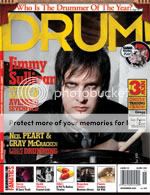
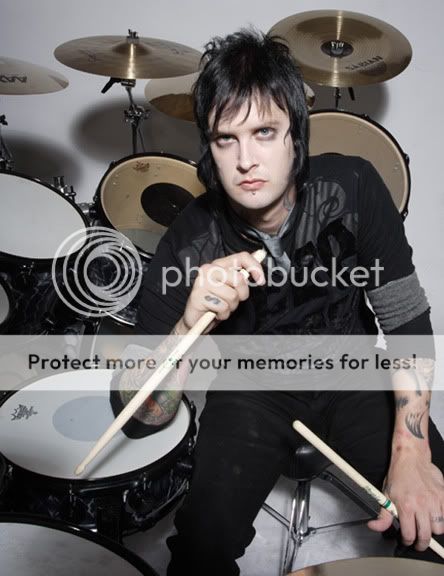
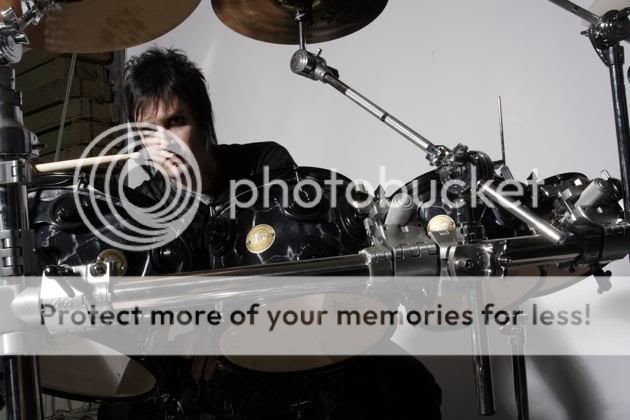
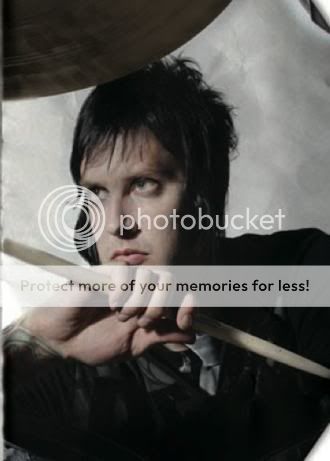

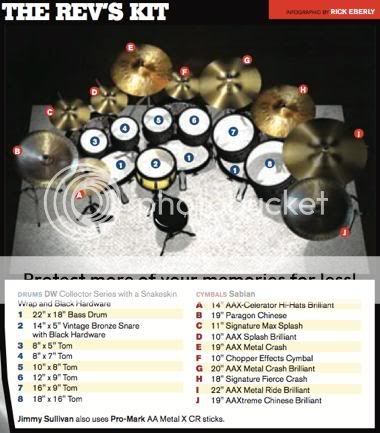 Edited by giada7x - 17/12/2019, 19:51
Edited by giada7x - 17/12/2019, 19:51


